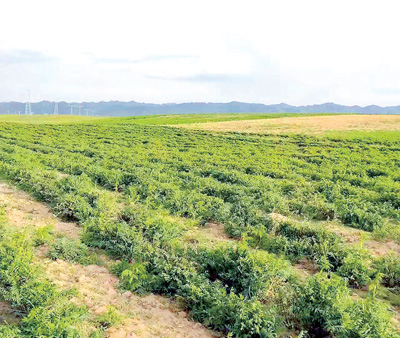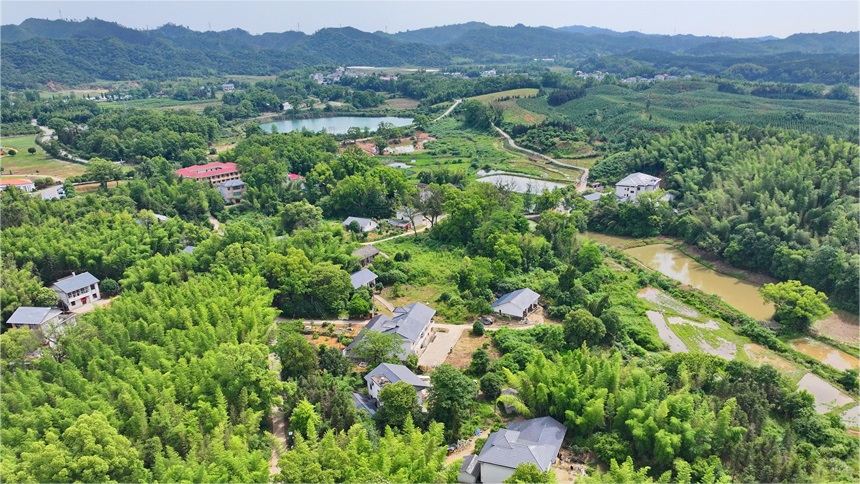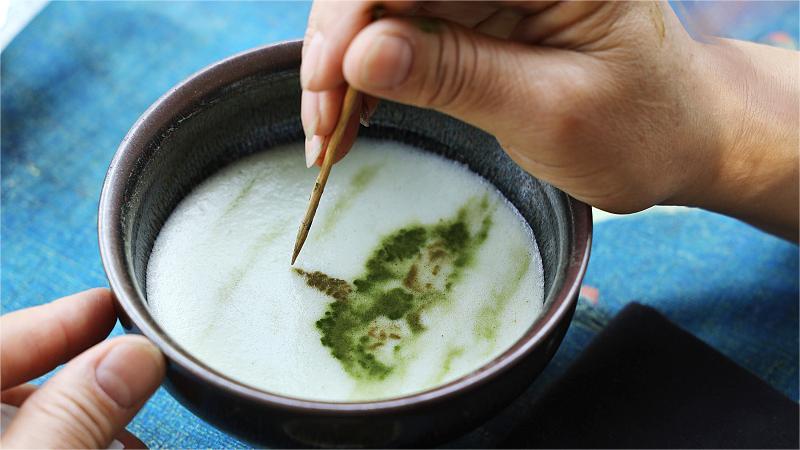China's Qinghai promotes characteristic planting, breeding industries through 'science and technology backyards'
Northwest China's Qinghai Province has facilitated the development of characteristic planting and breeding industries by taking multiple measures to enhance the team building of "science and technology backyards (STBs)," improve its system of sci-tech stations, and encourage the application of advances in science and technology, bringing tangible benefits to local farmers and herdsmen.

Agricultural technicians repair sowing equipment in northwest China's Qinghai Province. (Photo/Ma Yajun)
The STB is a practical and integrated talent cultivation model that China Agricultural University began exploring in 2008. It dispatches postgraduate students majoring in agricultural disciplines to the field, where they, based on what they have learned theoretically, study and solve real-world problems in agricultural and rural development to cultivate high-level agricultural talent and serve the modernization of agriculture and rural areas.
Yang Guozhu, a professor at the School of Ecological and Environmental Engineering of Qinghai University, is the head of an STB established last year in Beizha village, Gabasongduo township, Tongde county, Hainan Tibetan Autonomous Prefecture, Qinghai.
For many years, planting alfalfa, a type of perennial forage crop at an altitude of more than 3,000 meters above sea level, has been a challenge. Sci-tech experts, represented by Yang, have strived to overcome technical difficulties constraining the development of the local planting and breeding industries, greatly benefiting farmers and herdsmen.
"By leveraging the planting techniques provided by the STB in our village, we receive good yields. This year, we will expand the cultivation of forage crops by an additional 30,000 mu (200 hectares), including bulbous oat grass and alfalfa," said Niang Huaijia, a villager in Beizha village.
The man, who is also head of a planting and breeding cooperative in his 30s, has mastered the planting techniques of perennial forage crops after two years of learning from sci-tech experts.

Photo shows alfalfa in northwest China's Qinghai Province. (Photo courtesy of the interviewee)
Initially, Niang mainly grew forage crops like Dahurian wild rye and bulbous oat grass, both of which are annuals on the plateau. "As fodder, their nutritional value is limited and the price is below 2,000 yuan ($276.97) per tonne," he said.
Later, Niang switched to growing alfalfa after he learned that the perennial forage crop cultivated and promoted by the STB in Tongde county was very good.
"The alfalfa is a leguminous forage crop with relatively higher nutritional value. Its protein content is more than three times that of regular forage crops, and its price is also much higher," Yang said.
Perennial forage crops reduce the planting and management burden on herdsmen and have greater capabilities in soil, water and nutrient conservation.
The alfalfa has also been planted in Guinan and Guide counties in Qinghai. "Here is a field planted with Dahurian wild rye and alfalfa under the guidance of sci-tech experts so that they can overwinter," said Yao Leiming, deputy general manager of a local company at its forage crop demonstration base in Guinan county.
"The alfalfa can overwinter here. Last year, we grew 100 mu of alfalfa on a trial basis, and the per mu yield of dried alfalfa exceeded 800 kilograms, generated a combined income of nearly 400,000 yuan," said Ma Weiguo, head of a planting and breeding cooperative in Wangtun village, Guide county.
From one village to multiple places, the STB in Tongde county has continuously enhanced its scientific and technological service capabilities, which has enabled more farmers and herdsmen to grow perennial forage crops.

Yang Guozhu (left) and Ma Yajun, a PhD student at the Academy of Animal Sciences and Veterinary Medicine of Qinghai University, check on the growth of forage crops in an experimental field in Guide county, Hainan Tibetan Autonomous Prefecture, northwest China's Qinghai Province. (People's Daily/Qiao Dong)
It has promoted four perennial forage varieties across Qinghai Province, helping 23 cooperatives in the provincial capital Xining, Hainan Tibetan Autonomous Prefecture and Golog Tibetan Autonomous Prefecture grow alfalfa on over 3,000 mu of land, with a yield of 1,500 tonnes.
The STB in Tongde county is the upgraded version of the county's station for sci-tech experts, said Miao Xichun, director of the rural science and technology division of the Qinghai Provincial Department of Science and Technology.
"Each of our STB has a theme. The theme of the STB in Tongde county is the cultivation of forage crops and efficient livestock breeding," Miao added.
The alfalfa variety cultivated by the STB in Tongde county can survive winter at altitudes above 3,000 meters.
Yang has also collaborated with a cooperative in Xinghai county, Hainan Tibetan Autonomous Prefecture to implement a plan of growing alfalfa on over 1,000 mu of land at an altitude of over 4,000 meters. Now, the alfalfa there is growing vigorously.
Aside from Yang, the STB in Tongde county has over 10 experts specializing in areas such as agricultural machinery and animal husbandry from inside and outside the province. They have helped surrounding enterprises and cooperatives expand from forage cultivation to refined feed processing and efficient breeding, forming an industrial chain.

Photo shows a planting base of perennial leguminous forage crops in Guinan county, Hainan Tibetan Autonomous Prefecture, northwest China's Qinghai Province. (Photo courtesy of the interviewee)
"Qinghai is continuously improving its system of sci-tech stations represented by STBs, and promoting cooperation between sci-tech experts and enterprises and cooperatives, which has better facilitated the commercialization of scientific and technological advances," said Chen Yongxiang, head of the Qinghai Provincial Department of Science and Technology.
Over the past two years, Qinghai's sci-tech stations represented by STBs have offered training to 34,617 professional technicians, farmers and herdsmen, established 234 promotion and demonstration bases, promoted 364 new varieties with a planting area of 84,100 mu, applied 242 new technologies for 85,900 mu of land and efficient breeding of 112,900 livestock. These have generated an output value of 489 million yuan.
Photos
Related Stories
- China's Qinghai launches 750-kV power project connecting new energy to grid
- View of Qaidam Basin in China's Qinghai
- Discover the magical Qaidam Basin in NW China's Qinghai
- Tibetan fox spotted foraging in NW China's Qinghai
- China's Qinghai sees significant growth in green coverage in 2023
- 5.3-magnitude quake hits NW China's Qinghai
- All quake-affected middle, primary schools in Qinghai start new semester
Copyright © 2024 People's Daily Online. All Rights Reserved.









